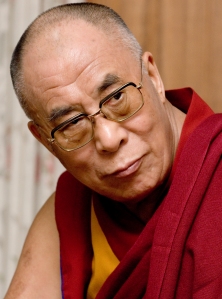Okay guys, watch out – it’s gonna get personal.
I’ve been thinking a lot about Judith Warner’s article in the New York Times and would like to add some more thoughts to our discussion.
I worry sometimes…not sometimes, often…about emotional health. Mine, and that of others. I’ve been feeling rather confused lately in regards to my meditation practice, Buddhism, and the magnitude of my emotions. Especially working with an autistic population where emotion is extremely confusing, overwhelming, and not understood, my perspective is shifting.
Judith Warner wrote:
Some of us experience our emotions always in capital letters and exclamation points. This isn’t always pleasant but, to go all mindful for a moment, it is what it is, and if you are one of these people then probably one of the great pleasures of your life is finding others like you and settling in with them for a good rant.
So this shows us…what? A lesson about Right Speech? Laziness on the path? Maybe it’s just being honest about what we, individually, want to get from our meditation practice.
Do I need to change?
Maybe I, like Judith Warner, am just one of those people who likes having big emotions. I mean, is Buddhism about quieting them down, or am I totally missing the point? Because sometimes I get really sad and dwell on it by listening to equally sad music. Sometimes I get really angry and avoid dealing with what’s really going on and stay angry for a while and kick my shoes around the room. Sometimes I get ecstatically happy and waltz around my apartment singing showtunes and want to hang on to that feeling even if maybe it would be more mindful of me to let it go. But as Judith Warner says, I don’t want to let it go. I don’t want those parts of me to be things that gradually fade away as I become more mindful. I do love my emotions. I would say that it’s probably better to not go barreling into other people (or yourself) with frenetic emotions driven by God-knows-what, but really people. We are human, right? Even if we meditate, we’re still stupid humans.
A couple weeks ago at the Writing Workshop at the ID Project, Cassie asked me how old I was. “I can’t believe you’re only 22!” she said. “You are so much more mature than most 22 year olds.”
Well Cassie, thanks, but no thanks. I hear that often and it worries me that maybe I’m missing out on the part of my life where society actually gives me some amount of permission to be stupid. And for that I (at least partially) blame my meditation practice, as well as my own neuroses.
Maybe my current struggle on the path is to stop being so fucking hard on myself and embrace my humanity. I do think there is such a thing as Buddhist guilt, just like there’s Jewish guilt and Catholic guilt. (I’m 2 out of 3 on this one. Whoa, Nelly, that’s a lot of guilt!) Unfortunately, most of it these days is self-inflicted. Wanting to be better than I am, more mindful, more at peace, more forgiving. How about impressed with myself? How about I’m freaking awesome? When do we get to sit with that one, guys?
I work in a world where emotion is so confused, and every day I thank God (or whoever) for my normal amount of being emotionally stupid. I’m thankful for my ability to be very angry, very happy, very in love, very sad, very frustrated, or just fine, and right now I’m content with all of that and don’t feel the need to be terribly different than I am.
So when I read an article like Judith Warner’s and the comments we’ve posted in reponse, saying that Judith Warner is clearly just starting out on the path, is in love with her emotions, probably doesn’t practice with a sangha, etc, it makes me wonder what the hell is going on. I mean, I related to her struggle, her attempt to grapple with these questions. Maybe that makes me the Second Worst Buddhist in the World?
And then Paul Griffin’s response in particular struck me: Before the journalist showed up, Trungpa warned his students that the journalists would get it all wrong, would write that Trungpa was teaching everyone to repress or quiet their emotions. He made every effort to make it clear that that was NOT the case. Nevertheless, when the story came out, the headline was something like, “Meditation For Quelling the Emotions”. (Note, I totally forget the actual headline, i.e., the punchline, but it was something like that.) Nevertheless, Naropa got a story in Time magazine. In America, a shred of attention goes a long way.
I am so flipping confused. Somebody, help me out before I go kick my rainboots around my kitchen while waltzing to Radiohead. No, kicking my sneakers around my kitchen since I’ll be wearing my rainboots in my kitchen because I’m going nuts.

